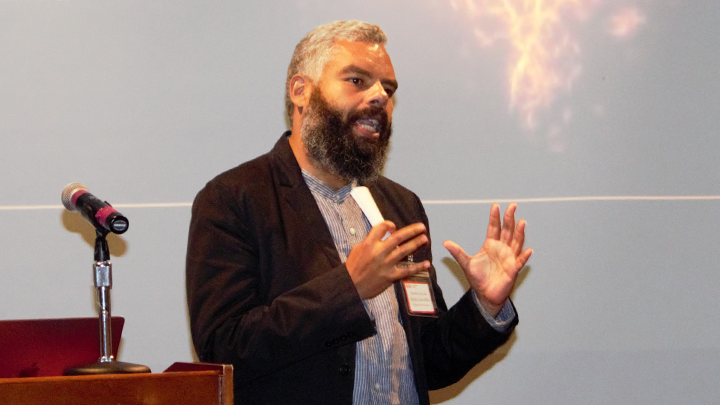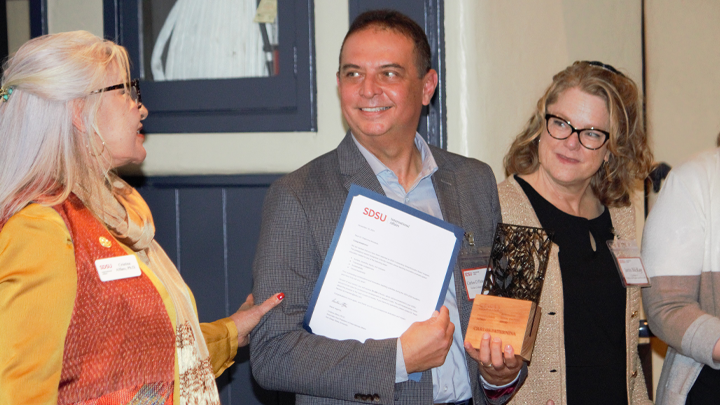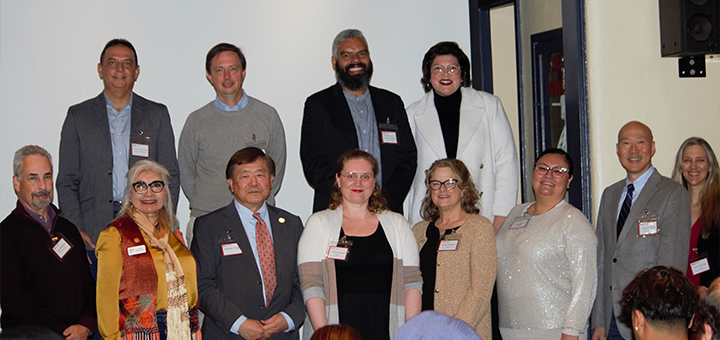Five SDSU professors earn 2024 Outstanding Faculty Global Engagement Awards
Recipients honored for their international and transborder research, education programs and activities that further SDSU’s goal of developing globally minded graduates.

San Diego State University professors who are working to redesign bilingual science education, probe tensions in the Amazon rainforest through art, spearhead cross-border environmental health labs, and open the door for more Colombian agriculture exports to America have been named recipients of the 2024 Outstanding Faculty Global Engagement Awards.
Now in its fourth year, the awards recognize SDSU professors and scholars for their global and transborder research, education and service. The honor promotes SDSU’s internationalization goals outlined in its Global Strategic Plan, which include producing globally conscious graduates who are prepared for an increasingly linguistically and culturally diverse international economy.
In addition to SDSU faculty, visiting Brazilian Professor Roberto Ivo Da Rocha Lima Filho also was honored with the Outstanding International Scholar Award.
The professors showcased their global engagement and transborder projects at a recent SDSU symposium at Scripps Cottage during International Education Week (IEW). “We are thrilled to recognize SDSU’s exceptional faculty members for their outstanding contributions to global engagement,” said Cristina Alfaro, associate vice president of International Affairs at SDSU. “Their work and research exemplifies the university’s commitment to fostering a diverse and inclusive academic community that addresses global challenges and promotes cross-cultural understanding.”
Here is a look at each winner and their award:
Carlos Paternina, assistant professor Fowler College of Business, Outstanding Global Educator Award
Paternina has focused on international education and global networks related to smart logistics and global supply chains. With decades of experience in Colombia, he received a grant aimed at strengthening academic ties between the U.S. and Latin America.
 Open the image full screen.
Open the image full screen.
The grant led to a Collaborative Online International Learning Course between SDSU and two universities in Colombia that enabled students to research ways to increase Colombia’s exports of cocoa, the main ingredient in chocolate, as an alternative to less desirable crops. Students learned how supply chains function in Latin America and barriers to exporting to the U.S.
“The main goal was to train global leaders to empower global economies, “ said Paternina. “If you want to do global business with supply chains in agriculture, then Mexico, Colombia, Peru, Costa Rica, all those countries are suppliers to the U.S., and we want to learn how they do it in those places.”
Paternina is pursuing additional partnerships with universities in Mexico to expand the supply chain research, possibly to include avocados, wine and other agricultural products.
Gillian Sneed, assistant professor, College of Professional Studies and Fine Arts, Outstanding Global Research & Activity Award
Last spring, Sneed, an art historian, curated “The Imaginary Amazon” exhibition at the University Art Gallery, exploring complex themes around climate change, colonialism in Latin America, and Indigenous perspectives on the Amazon region.
 Open the image full screen.
Open the image full screen.
The exhibit, inspired in part by the rise in wildfires in one of the world’s most biologically diverse rainforests, included works from artists across different media and from indigenous peoples. Sneed also raised funds to bring several international artists to San Diego for the exhibition, enabling discussions with students and the community.
In addition, National Public Radio’s program “The World from PRX” aired a segment on the exhibition and included a written review on its website.
“Ultimately, this exhibition and its programming raised awareness around the pressing contemporary crises the Amazon rainforest is experiencing and shed light on the threat faced by indigenous populations who reside there, emphasizing their fight to protect their culture and environment,” said Sneed.
Melissa Navarro Martell, associate professor, College of Education, Outstanding Transborder Educator Award
Navarro Martell is a leader in the STEAM Sin Fronteras Project, a cross-border education initiative in Science, Technology, Engineering, Arts, and Mathematics. It joins higher education institutions in Mexico and the U.S. to focus on teaching methods for bilingual and cross-cultural students, particularly with regards to science and math.
 Open the image full screen.
Open the image full screen.
One goal is preparing teachers to be aware of the injustices that appear in math and science education, so they develop critical consciousness regarding how these subjects are taught in a binational context.
“I like introducing myself as an elementary or middle school teacher who decided to get a Ph.D., to have a more significant impact on education, particularly to find ways to increase opportunities for multilingual children to have access to critical science by advancing the goal of bilingual/binational science education,” said Navarro Martell, who was born and educated in Tijuana before attending U.S. schools.
“With this project, we are interested in finding out how teachers in the Cali-Baja region can be prepared to teach critical STEAM that’s inclusive of trans-migrant students’ culture and linguistic repertoires,” she said.
Linda Lara Jacobo, assistant professor, College of Health and Human Services SDSU Imperial Valley, Outstanding Transborder Research & Creative Activity Award
Jacobo, who teaches in the School of Public Health, has championed science that considers binational environmental and health problems collectively, rather than as one problem on the U.S. side of the border and a separate problem in Mexico. To that end, she is co-founder and co-director of the US-MEXICO Binational Border Research Laboratory, with locations in Imperial Valley and Mexicali.
 Open the image full screen.
Open the image full screen.
“There is no border when you are talking about science,” she said. “In issues related to environmental health, we want to solve problems in both countries.”
The establishment of collaborative labs between SDSU Imperial Valley and Universidad Autónoma de Baja California Mexicali allows researchers to better coordinate on environmental issues for populations that not only cross the border frequently, but also share water, air and soil, she said.
The joint lab project is also monitoring diseases in migratory birds and tracking allergies and asthma cases in the Imperial Valley/Mexicali region where heat waves result in people spending more time indoors.
Roberto Ivo Da Rocha Lima Filho, International Visiting Scholar, Behner Stiefel Center for Brazilian Studies, Outstanding International Scholar Award
An economist and tenured professor at Federal University of Rio de Janeiro, Lima Filho has contributed to SDSU internationalization efforts through his teaching and research at both the Imperial Valley and San Diego campuses.
He has been active in engaging students in research experiences, particularly at SDSU Imperial Valley. He also is lauded for integrating diverse voices and narratives from Latin America into the courses that he teaches.
Lima Filho serves as SDSU’s Brazil Sustainability Initiative fellows and works on a National Science Foundation research project on how extreme heat in urban Rio de Janeiro and in rural Imperial Valley impact behavior, particularly financial decision making.
“Imagine that you are living in this extreme heat and it affects your ability to make decisions,” he said. “Our decisions, our behaviors and our lives are not just a product of our minds but are also shaped by our circumstances.”
 Open the image full screen.
Open the image full screen.



